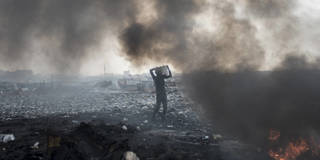
We Are All Biomass
It is a fantasy to think that our trash- and commodity-filled environments can be left behind and replaced by life in some idyllic “natural,” ecologically sustainable environment. But perhaps the loss of that option can become the basis for a new, global sense of solidarity.
LJUBLJANA – In a recent commentary, philosopher Michael Marder looks beyond the immediate horror of what is taking place in Gaza to consider the ontological implications of what we see in the long-distance drone shots of the ruins. Allow me to quote him at length: